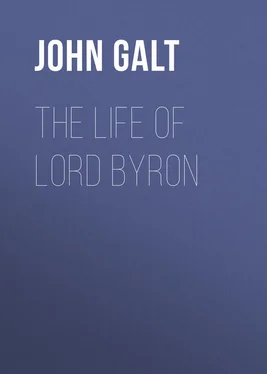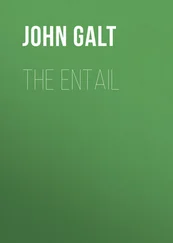John Galt - The Life of Lord Byron
Здесь есть возможность читать онлайн «John Galt - The Life of Lord Byron» — ознакомительный отрывок электронной книги совершенно бесплатно, а после прочтения отрывка купить полную версию. В некоторых случаях можно слушать аудио, скачать через торрент в формате fb2 и присутствует краткое содержание. Жанр: foreign_antique, foreign_prose, на английском языке. Описание произведения, (предисловие) а так же отзывы посетителей доступны на портале библиотеки ЛибКат.
- Название:The Life of Lord Byron
- Автор:
- Жанр:
- Год:неизвестен
- ISBN:нет данных
- Рейтинг книги:4 / 5. Голосов: 1
-
Избранное:Добавить в избранное
- Отзывы:
-
Ваша оценка:
- 80
- 1
- 2
- 3
- 4
- 5
The Life of Lord Byron: краткое содержание, описание и аннотация
Предлагаем к чтению аннотацию, описание, краткое содержание или предисловие (зависит от того, что написал сам автор книги «The Life of Lord Byron»). Если вы не нашли необходимую информацию о книге — напишите в комментариях, мы постараемся отыскать её.
The Life of Lord Byron — читать онлайн ознакомительный отрывок
Ниже представлен текст книги, разбитый по страницам. Система сохранения места последней прочитанной страницы, позволяет с удобством читать онлайн бесплатно книгу «The Life of Lord Byron», без необходимости каждый раз заново искать на чём Вы остановились. Поставьте закладку, и сможете в любой момент перейти на страницу, на которой закончили чтение.
Интервал:
Закладка:
“This doctrine of antipathies, contracted by the impatience of youth against the noblest authors of antiquity, from the circumstance of having been made the vehicle of early instruction, is a most dangerous doctrine indeed; since it strikes at the root, not only of all pure taste, but of all praiseworthy industry. It would, if acted upon (as Harold by the mention of the Continental practice of using inferior writers in the business of tuition would seem to recommend), destroy the great source of the intellectual vigour of our countrymen.”
This is, undoubtedly, assuming too much; for those who have objected to the years “wasted” in teaching the dead languages, do not admit that the labour of acquiring them either improves the taste or adds to the vigour of the understanding; and, therefore, before the soundness of the opinion of Milton, of Cowley, of Addison, and of many other great men can be rejected, it falls on those who are of Dean Vincent’s opinion, and that of Childe Harold’s Monitor , to prove that the study of the learned languages is of so much primary importance as they claim for it.
But it appears that Byron’s mind, during the early period of his residence at Harrow, was occupied with another object than his studies, and which may partly account for his inattention to them. He fell in love with Mary Chaworth. “She was,” he is represented to have said, “several years older than myself, but at my age boys like something older than themselves, as they do younger later in life. Our estates adjoined, but owing to the unhappy circumstances of the feud (the affair of the fatal duel), our families, as is generally the case with neighbours, who happen to be near relations, were never on terms of more than common civility, scarcely those. She was the beau ideal of all that my youthful fancy could paint of the beautiful! and I have taken all my fables about the celestial nature of women from the perfection my imagination created in her. I say created, for I found her, like the rest of the sex, anything but angelic. I returned to Harrow, after my trip to Cheltenham, more deeply enamoured than ever, and passed the next holidays at Newstead. I now began to fancy myself a man, and to make love in earnest. Our meetings were stolen ones, and my letters passed through the medium of a confidant. A gate leading from Mr Chaworth’s grounds to those of my mother, was the place of our interviews, but the ardour was all on my side; I was serious, she was volatile. She liked me as a younger brother, and treated and laughed at me as a boy; she, however, gave me her picture, and that was something to make verses upon. Had I married Miss Chaworth, perhaps the whole tenor of my life would have been different; she jilted me, however, but her marriage proved anything but a happy one.” It is to this attachment that we are indebted for the beautiful poem of The Dream , and the stanzas beginning
Oh, had my fate been joined to thine!
Although this love affair a little interfered with his Greek and Latin, his time was not passed without some attention to reading. Until he was eighteen years old, he had never seen a review; but his general information was so extensive on modern topics, as to induce a suspicion that he could only have collected so much information from reviews, as he was never seen reading, but always idle, and in mischief, or at play. He was, however, a devourer of books; he read eating, read in bed, read when no one else read, and had perused all sorts of books from the time he first could spell, but had never read a review, and knew not what the name implied.
It should be here noticed, that while he was at Harrow, his qualities were rather oratorical than poetical; and if an opinion had then been formed of the likely result of his character, the prognostication would have led to the expectation of an orator. Altogether, his conduct at Harrow indicated a clever, but not an extraordinary boy. He formed a few friendships there, in which his attachment appears to have been, in some instances, remarkable. The late Duke of Dorset was his fag, and he was not considered a very hard taskmaster. He certainly did not carry with him from Harrow any anticipation of that splendid career he was destined to run as a poet.
CHAPTER V
Character at Harrow—Poetical Predilections—Byron at Cambridge—His “Hours of Idleness”
In reconsidering the four years which Byron spent at Harrow, while we can clearly trace the development of the sensibilities of his character, and an increased tension of his susceptibility, by which impressions became more acute and delicate, it seems impossible not to perceive by the records which he has himself left of his feelings, that something morbid was induced upon them. Had he not afterwards so magnificently distinguished himself as a poet, it is not probable that he would have been recollected by his schoolfellows as having been in any respect different from the common herd. His activity and spirit, in their controversies and quarrels, were but the outbreakings of that temperament which the discipline of riper years, and the natural awe of the world, afterward reduced into his hereditary cast of character, in which so much of sullenness and misanthropy was exhibited. I cannot, however, think that there was anything either in the nature of his pastimes, or his studies, unfavourable to the formation of the poetical character. His amusements were active; his reading, though without method, was yet congenial to his impassioned imagination; and the phantom of an enthusiastic attachment, of which Miss Chaworth was not the only object (for it was altogether intellectual, and shared with others), were circumstances calculated to open various sources of reflection, and to concentrate the elements of an energetic and original mind.
But it is no easy matter to sketch what may have been the outline of a young poet’s education. The supposition that poets must be dreamers, because there is often much dreaminess in poesy, is a mere hypothesis. Of all the professors of metaphysical discernment, poets require the finest tact; and contemplation is with them a sign of inward abstract reflection, more than of any process of mind by which resemblance is traced, and associations awakened. There is no account of any great poet, whose genius was of that dreamy cartilaginous kind, which hath its being in haze, and draws its nourishment from lights and shadows; which ponders over the mysteries of trees, and interprets the oracles of babbling waters. They have all been men – worldly men, different only from others in reasoning more by feeling than induction. Directed by impulse, in a greater degree than other men, poets are apt to be betrayed into actions which make them singular, as compared by those who are less imaginative; but the effects of earnestness should never be confounded with the qualities of talent.
No greater misconception has ever been obtruded upon the world as philosophic criticism, than the theory of poets being the offspring of “capering lambkins and cooing doves”; for they differ in no respect from other men of high endowment, but in the single circumstance of the objects to which their taste is attracted. The most vigorous poets, those who have influenced longest and are most quoted, have indeed been all men of great shrewdness of remark, and anything but your chin-on-hand contemplators. To adduce many instances is unnecessary. Are there any symptoms of the gelatinous character of the effusions of the Lakers in the compositions of Homer? The London Gazette does not tell us things more like facts than the narratives of Homer, and it often states facts that are much more like fictions than his most poetical inventions. So much is this the case with the works of all the higher poets, that as they recede from that worldly standard which is found in the Epics of Homer, they sink in the scale of poets. In what does the inferiority of Virgil, for example, consist, but in his having hatched fancies in his contemplations which the calm mind rejects as absurdities. Then Tasso, with his enchanted forests and his other improbabilities; are they more than childish tales? tales, too, not in fancy to be compared with those of that venerable dry-nurse, Mother Bunch. Compare the poets that babble of green fields with those who deal in the actions and passions of men, such as Shakspeare, and it must be confessed that it is not those who have looked at external nature who are the true poets, but those who have seen and considered most about the business and bosom of man. It may be an advantage that a poet should have the benefit of landscapes and storms, as children are the better for country air and cow’s milk; but the true scene of their manly work and business is in the populous city. Inasmuch as Byron was a lover of solitude, he was deficient as an observer of men.
Читать дальшеИнтервал:
Закладка:
Похожие книги на «The Life of Lord Byron»
Представляем Вашему вниманию похожие книги на «The Life of Lord Byron» списком для выбора. Мы отобрали схожую по названию и смыслу литературу в надежде предоставить читателям больше вариантов отыскать новые, интересные, ещё непрочитанные произведения.
Обсуждение, отзывы о книге «The Life of Lord Byron» и просто собственные мнения читателей. Оставьте ваши комментарии, напишите, что Вы думаете о произведении, его смысле или главных героях. Укажите что конкретно понравилось, а что нет, и почему Вы так считаете.












